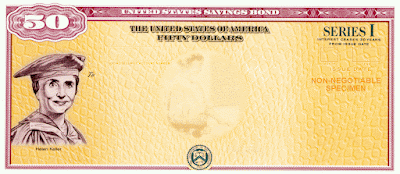I wrote before how my neighbor had all his money tied up in CDs paying 8% interest. They were issued in an era of higher inflation and higher interest rates and when he retired, well, the rate of return on ordinary savings and CDs was 1% if you were lucky. So he hung onto those "old" CDs until they matured and lived off the interest.
Of course, there are problems with that. CDs are only FDIC insured for like $250,000 or so, and you can't "stack" FDIC insurance by holding multiple CDs of $250,000 each at one bank. If the bank goes bust, the FDIC pays out - once. The other problem, of course, is that CDs eventually mature and then you have to find something else to invest in.
The third problem is, of course, that when he bought these CDs back in the 2000's, the rates were "good" by 2020 standards but "meh" by the standards of the era they were issued in. So you have to hang on to these dog CDs which are worth more only later, and only then if rates go down. Sort of like life insurance - it is a big nothing until later in life, but even then, a mutual fund might be a better idea.
A reader writes suggesting I check out Series I savings bonds - so-called "inflation" bonds as they pay interest plus an inflation adjustment. They beat out Series EE bonds that are paying (or were paying) fractions of a percent in interest (unless you held them to maturity), or C of I bonds which paid no interest whatsoever.
The rates and terms of the Series I bonds do look attractive, until you realize that inflation is currently running at 8% or more:
Current rate: 7.12% for bonds issued November 2021 - April 2022Minimum purchase: Electronic bond: $25Paper bond: $50Maximum purchase (per calendar year):
Electronic bonds: $10,000Paper bonds: $5,000Denominations: Paper bonds: $50, $100, $200, $500, $1,000Electronic bonds: $25 and above, in penny incrementsIssue method: Electronic bonds: Online in TreasuryDirectPaper bonds: By mail after you buy with your tax refund
Note the limitation on investing - $10,000 per person. My reader claims you can double this by making "gift" bonds to your spouse. So, theoretically, you could tuck away $40,000 into these bonds, for a couple.
Are these a good deal? Well, like anything else there are advantages and disadvantages. Yes, it is probably one of the safest places to "park money" as it is government-backed. The rates beat ordinary savings accounts, most CDs, and of course EE bonds. Treasury Direct is a good, secure site, and you can set up an account to automatically debit your account by $100 a month or whatever, to do a "forced savings" plan if you are starting out. There may be tax advantages - you may be exempt from State taxes and delay paying Federal taxes until maturity.
Downsides? Well, it is an after-tax investment, so you can't put it in a IRA plan. It is a long-term investment, too. While it is liquid (just click your mouse and you can sell out) there are penalties for early withdrawal. And there are limits as to how much you can invest - which is probably a good thing. Also, it is not clear to me how the interest works. Right now, it is pretty high as inflation is high. But if inflation abates (which it usually does, over time) then the rates may go down - unlike my neighbor's CDs. Finally, while 7% and above sounds great, bear in mind that inflation today is running 8% or more - so you are running in place, basically.
If you have after-tax money laying around in a savings account, it might not be a bad idea to investigate. If you are starting out saving, it is a good way to put a little money aside (assuming first you reduce you spending by a similar amount) over time to build up after-tax savings. It is also a good way to diversify an existing portfolio.
I threw some money at it and will add more down the road. But since most of my wealth is in pre-tax accounts (such as IRAs) I don't have too much to invest at the present time.
Beats buying crypto!
UPDATE: A reader advises that after May 1st, the interest rate will be over 9%, so if you wait until then....



